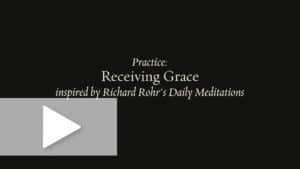
Sunday
Healthy religion is always humble about its own holiness and knowledge. It knows that it does not know. Anybody who really knows also knows that they don’t know at all. —Richard Rohr
Monday
In my experience, the people who find God are usually people who are very serious about their quest and their questions, more so than being absolutely certain about their answers. —Richard Rohr
Tuesday
We may come to a place that points beyond conceptions so that we may start to discover what God is not and allow room for what we can hardly conceive—God is no thing. —Lisa Colón DeLay
Wednesday
Contemplation is a wordless resting in the presence of God beyond all thoughts and images. So, in contemplation, we’re not thinking of anything. We’re not thinking of anything, but we’re wordlessly resting in a presence beyond thought that’s intimately accessing our heart as we intimately access it, and we rest in the oneness. —James Finley
Thursday
What if it was exactly at the point at which the words go wobbly, at which they start to slip through our fingers, that we might find ourselves able to take an unobstructed glimpse into holy truth? —Janet P. Williams
Friday
When we come before the tremendous mystery of God, all we can do is mutter. We know whatever just happened is beyond words, beyond proving, and beyond any kind of rational certitude. Our present notion of God is never it, because if we comprehend it, it is not God. —Richard Rohr
Receiving “Grace”
In her book Seeking the God Beyond, Anglican priest and author Janet P. Williams suggests poetry as a helpful way for individuals to move beyond ordinary patterns of thought and prayer. She writes, “Poems address mystery and reality sufficiently obliquely that in them we can, as Emily Dickinson demanded, ‘tell the truth [a]slant.’” [1] We invite you to click on the image below to listen to a poem entitled “Grace” by Australian poet Judith Wright [1915–2000]. Through prayerful listening, the poem becomes an invitation to experience God beyond what we can know. Here is an excerpt:
Living is dailiness, a simple bread
That’s worth the eating. But I have known a wine,
a drunkenness that can’t be spoken or sung . . .
It seems to have nothing to do with things at all . . .
[it] takes over the depth of flesh, the inward eye . . .
because it occurs beyond the here and now, positives, negatives, what we hope and are. [2]
References:
[1] J. P. Williams, Seeking the God Beyond: A Beginner’s Guide to Christian Apophatic Spirituality (Eugene, OR: Cascade, 2019), 161.
[2] Judith Wright, “Grace,” in The Double Tree: Selected Poems, 1942–1976 (Boston: Houghton Mifflin, 1978), 143.
Explore Further. . .
- Read about poetry’s capacity to point us toward Mystery.
- Learn more about this year’s theme Nothing Stands Alone.
- Meet the team behind the Daily Meditations.
Image credit: Chaokun Wang, 夜 night (detail), 2017, photograph, China, Creative Commons. Unknown Author, Close-up of New Growth (detail), 1970, photograph, British Columbia, Public Domain. Chaokun Wang, 竹子 bamboo (detail), 2015, photograph, Heifei, Creative Commons. Jenna Keiper & Leslye Colvin, 2022, triptych art, United States. Click here to enlarge the image.
This week’s images appear in a form inspired by early Christian/Catholic triptych art: a threefold form that tells a unified story.
Image inspiration: Moonlight, dewdrops, the overnight growth of bamboo. Nature reveals the great mystery of the Divine in the cycles and patterns of life.
Prayer for our community:
God, Lord of all creation, lover of life and of everything, please help us to love in our very small way what You love infinitely and everywhere. We thank You that we can offer just this one prayer and that will be more than enough, because in reality every thing and every one is connected, and nothing stands alone. To pray for one part is really to pray for the whole, and so we do. Help us each day to stand for love, for healing, for the good, for the diverse unity of the Body of Christ and all creation, because we know this is what You desire: as Jesus prayed, that all may be one. We offer our prayer together with all the holy names of God, we offer our prayer together with Christ, our Lord, Amen.


